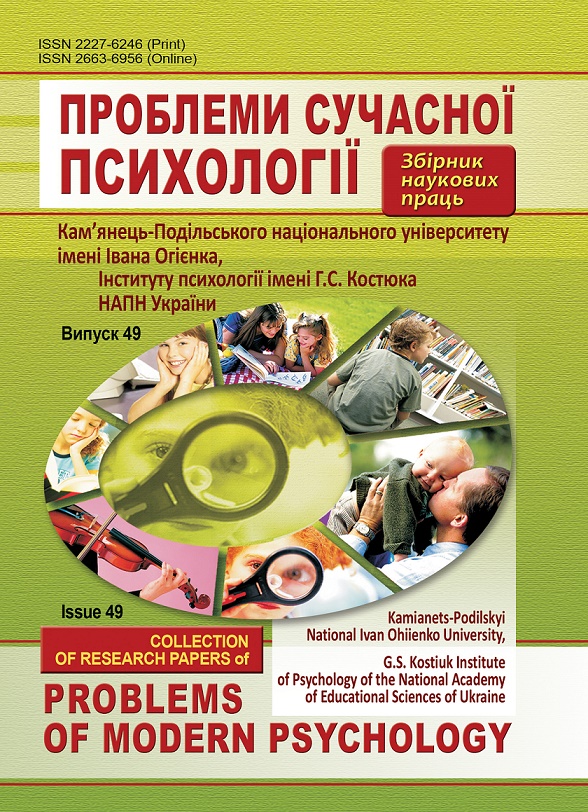Creative Parameters for Adult Active Web Users
DOI:
https://doi.org/10.32626/2227-6246.2020-49.224-243Keywords:
sign system, printed word, media image, verbal creativity, visual creativity.Abstract
The aim of the article is to analyze empirical data that test the hypothesis of greater creativity of active Internet users compared to adult fans of traditional reading.
Methods. The study was conducted on a statistically large and homogeneous sample by age, level of education and professional activity (the sphere of mental work). The differentiation of respondents into groups for comparative analysis was carried out on the basis of two criteria: 1) the choice of information system in free time (book or Internet); 2) the time allocated to work with the specified system. The criteria were determined through anonymous and voluntary questionnaires. The parameters of creativity were measured for different types of creativity: verbal (Mednik’s test in the adaptation of A. A. Voronin) and figurative (Sievert’s test).
The research presents the results of the comparative analysis conducted in two contrasting groups that select different information systems: subjects of reading and active web users. Statistically significant advantages of reading subjects in the expression of most of the measured parameters of both verbal (uniqueness and number of responses) and figurative (uniqueness and number of associations from remote areas) creativity were established.
Conclusions. It is empirically proved that there are significantly more creative people among fans of traditional printed books. This demonstrates that the technical capabilities of the Internet (the richness of content, the possibility of free choice of content and participation in its creation, etc.) do not automatically provide conditions for the display of creative abilities of users. An explanation is offered for the lower creativity of adult active web users through the specifics of the media image as the main unit of encoding information in digital media (the iconic nature of information and the suggestiveness of impact).
References
Анастази А., Урбина С. Психологическое тестирование. Санкт-Петер¬бург : Питер, 2003. 688 с.
Богоявленская Д. Б. Психология творческих способностей. Москва : Академия, 2002. 320 с.
Воронин А. Н., Галкин Т. В. Диагностика вербальной креативности (адаптация теста Медника). Методы психологической диагности¬ки. Москва : Ин-т психологии РАН, 1994. Вып. 2. С. 40–81.
Голубинская А. В. Нейрокогнитивный подход к исследованию поколе¬ния Z. International Journal of Humanities and Natural Science. 2015. Vol. 1. P. 161–167.
Гусельцева М. С. Информационная социализация в транзитивном обще¬стве: контексты дигимодернизма. Цифровое общество как куль¬турный контекст развития человека: сб. науч. ст. и материа¬лов междунар. конф. (Коломна, 14–17 февр. 2018 г.). Коломна : Гос. соц.-гуманитар. ун-т, 2018. С. 135–141.
Дружинин В. Н. Психология общих способностей. Санкт-Петербург : Питер, 1999. 368 с.
Ильин Е. П. Психология творчества, креативности, одаренности. Санкт-Петербург : Питер, 2009. 434 с.
Катречко С. Л. О соотношении искусственного и естественного интел¬лекта. Философия искусственного интеллекта: науч. тр. Всерос. междисциплинар. конф. (Москва, 16–17 марта 2016 г.). Москва : ИИнтелл, 2017. С. 304–319.
Киреев П. С. Новые медиа в современном информационно-коммуника¬ционном пространстве. Социология. 2010. № 2. С. 115–127.
Лекторский В. А. Философия, искусственный интеллект, когнитивные исследования. Философия искусственного интеллекта: науч. тр. Всерос. междисциплинар. конф. (Москва, 17–18 марта 2016 г.). Москва : ИИнтелл, 2017. С. 37–44.
Миронов В. В. Трансформация культур: от классической к электрон¬ной. Философия искусственного интеллекта: науч. тр. Всерос. междисциплинар. конф. (Москва, 17–18 марта 2016 г.). Москва : ИИнтелл, 2017. С. 28–36.
Холодная М. А. Когнитивные стили. О природе индивидуального ума. Санкт-Петербург : Питер, 2004. 384 с.
Guilford, J. P. (1958). New frontiers of testing in the discovery and development of human talent. Seventh Annual Western Regional Conference on Testing Problems. Los Angeles. Р. 20–32.
Guilford, J. P. (1959). Three faces of intellect. American Psychologist, 14, 469–479.
Kirby, A. (2009). Digimodernism: How New Technologies Dismantle the Postmodern and Reconfigure Our Culture. New York : Continuum Publishing Corporation.
Sternberg, R. J., & Davidson, J. E. (1986). Conceptions of giftedness: A map of the terrain. In R. J. Sternberg, J. E. Davidson (Eds.) Conceptions of giftedness. New York : Cambridge University Press. Р. 3–18.
Downloads
Published
How to Cite
Issue
Section
License
Copyright
The Editorial Board has the full right to publish original scientific papers containing results of theoretical and experimental research works which are not currently subject to review for publication in other scientific editions. The Author shall transfer to the editorial board of the Collection the right to spread the electronic version of the paper, as well as the electronic version of the paper translated into English (for papers originally submitted in Ukrainian and Russian) by all kinds of electronic means (placement at the official website of the Collection, electronic databases, repositories etc).
The Author of an article reserves the right to use materials of the paper, without approval with the editorial board and the founders of this Collection: a) partially or fully, for educational purposes; b) for writing own dissertation papers; c) for preparation of abstracts, conference reports and presentations.
The Author of an article can place electronic copies of the paper (including the final electronic version downloaded from the official website of the Collection) at:
- personal web resources of all Authors (websites, webpages, blogs etc.);
- web resources of the institutions where the Authors are employed (including electronic institutional repositories);
- non-profit public access web resources (for example, arXiv.org).
But in all cases, it is obligatory to have a bibliographic reference to the paper, or a hyperlink to its electronic copy placed at the official website of this Collection.






